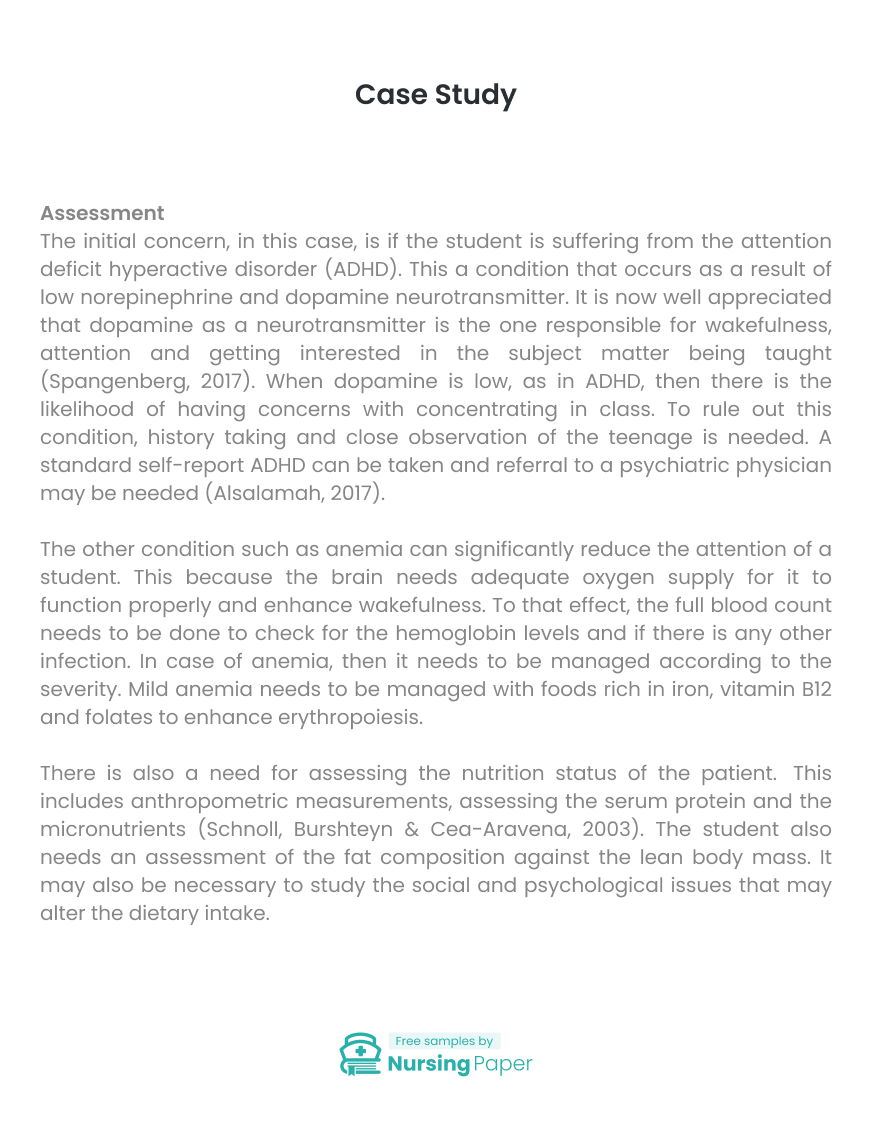
Case Study
Assessment
The initial concern, in this case, is if the student is suffering from the attention deficit hyperactive disorder (ADHD). This a condition that occurs as a result of low norepinephrine and dopamine neurotransmitter. It is now well appreciated that dopamine as a neurotransmitter is the one responsible for wakefulness, attention and getting interested in the subject matter being taught (Spangenberg, 2017). When dopamine is low, as in ADHD, then there is the likelihood of having concerns with concentrating in class. To rule out this condition, history taking and close observation of the teenage is needed. A standard self-report ADHD can be taken and referral to a psychiatric physician may be needed (Alsalamah, 2017).
The other condition such as anemia can significantly reduce the attention of a student. This because the brain needs adequate oxygen supply for it to function properly and enhance wakefulness. To that effect, the full blood count needs to be done to check for the hemoglobin levels and if there is any other infection. In case of anemia, then it needs to be managed according to the severity. Mild anemia needs to be managed with foods rich in iron, vitamin B12 and folates to enhance erythropoiesis.


There is also a need for assessing the nutrition status of the patient. This includes anthropometric measurements, assessing the serum protein and the micronutrients (Schnoll, Burshteyn & Cea-Aravena, 2003). The student also needs an assessment of the fat composition against the lean body mass. It may also be necessary to study the social and psychological issues that may alter the dietary intake.
Pharmacological
The plan depends on the findings from the assessment. In case of anemia then the patient is given hematinic to replenish blood. This can be through prescribing a feeding regimen that will enhance erythropoiesis.
Non-pharmacological
The background of the patient should be evaluated. This may include birth trauma, especially head injury. This is to identify if there are cases of assault, drunkard parents, underfeeding or domestic violence (Shukla, 2018) that can lead to depression and underfeeding. Such psychosocial issues have a huge impact on attention span in the class.

Referral
In case of Attention Deficit Hyperactive Disorder is doubted, then there is a need for referral for further screening with a psychiatric specialist. It may also be important to refer the patient to a psychotherapist or counselor (Shukla, 2018).
Health Promotion Strategy
Health education to the community with regard to nutrition that boosts attention. Educating parents on the need of having a jovial family that enhance the psychological health of their children. Encouraging health screening in order to identify diseases in early stages.
1. Centers for Disease Control and Prevention. (2013). Youth risk behavior surveillance
2. System (YRBSS). Retrieved from http://www.cdc.gov/healthyyouth/data/yrbs/index.htm
3. Spangenberg, E. D. (2017). Comparing the Achievement Goal Orientation of Mathematics Learners with and without Attention-Deficit Hyperactivity Disorder. South African Journal Of Education, 37(3),
4. Alsalamah, A. (2017). Use of the Self-Monitoring Strategy among Students with Attention Deficit Hyperactivity Disorder: A Systematic Review. Journal Of Education And Practice, 8(14), 118-125
5. Shukla, A. (2018). Impact of counselling on child’s attention deficit disorder. Indian Journal Of Health & Wellbeing, 9(2), 276-279
6. Schnoll, R., Burshteyn, D., & Cea-Aravena, J. (2003). Nutrition in the Treatment of Attention-Deficit Hyperactivity Disorder: A Neglected but Important Aspect. Applied Psychophysiology & Biofeedback, 28(1), 63-75.



The download will start shortly.

The download will start shortly.
 Subject:
Health and Social Care
Subject:
Health and Social Care  Number of pages: 3
Number of pages: 3  Subject:
Medicine
Subject:
Medicine  Number of pages: 4
Number of pages: 4  Subject:
Medicine
Subject:
Medicine  Number of pages: 13
Number of pages: 13  Subject:
Medicine
Subject:
Medicine  Number of pages: 3
Number of pages: 3  Subject:
Medicine
Subject:
Medicine  Number of pages: 2
Number of pages: 2  Subject:
Health and Social Care
Subject:
Health and Social Care  Number of pages: 2
Number of pages: 2  Subject:
Medicine
Subject:
Medicine  Number of pages: 11
Number of pages: 11  Subject:
Medicine
Subject:
Medicine  Number of pages: 11
Number of pages: 11  Subject:
Health and Social Care
Subject:
Health and Social Care  Number of pages: 5
Number of pages: 5  Subject:
Medicine
Subject:
Medicine  Number of pages: 4
Number of pages: 4  Subject:
Health and Social Care
Subject:
Health and Social Care  Number of pages: 1
Number of pages: 1  Subject:
Nursing
Subject:
Nursing  Number of pages: 3
Number of pages: 3  Subject:
Health and Social Care
Subject:
Health and Social Care  Number of pages: 4
Number of pages: 4  Subject:
Health and Social Care
Subject:
Health and Social Care  Number of pages: 10
Number of pages: 10  Subject:
Nursing
Subject:
Nursing  Number of pages: 5
Number of pages: 5 
